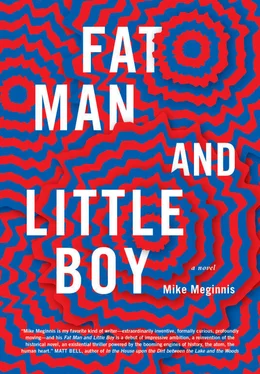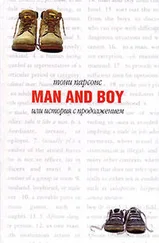The brother bombs plunge into the woods, Fat Man heaving like a panicked ape, Little Boy whipped by thin branches, loose roots, string trees. They run blind, surrounded by sinister rustling, leaves crunching underfoot. Soon rain begins to fall, making the whole forest seem to swarm with lives, with sick Japanese, with raging soldiers. Sometimes they hear a distant curse. They fall and scrape their knees. They stop to breathe when Fat Man says that he can’t make it, he won’t make it. A twig snaps. They’re running again.
They come to an abandoned farm, now lousy with rotten gourds and collapsed melons. This could have happened many ways, but Little Boy chooses to believe the family collapsed when the men were called to fight the Yanks.
“I can’t run anymore,” heaves Fat Man. “I’m going to throw up. I’m so thirsty.”
“One thing at a time,” says Little Boy. “First we hide and hope they don’t kill us.” He surveys the land. There is a shelter, but someone may still live there, and the spot is too obvious. Little Boy spies a slightly raised patch of dirt, a very small hill, crowned with dead vegetables and wild grass. He leads his brother there. Fat Man hobbles, clutching at his lungs through his chest as if to arrest their labors.
“Lie down in the muck,” says Little Boy.
Rain is pelting them loudly. Fat Man does as he is told—belly up like a dead tuna.
Little Boy kicks mud on his brother, and gourds and so on. “Lie very still,” he says. He lies down as well, on his belly, head-to-toes with Fat Man, the rice bag clutched under his chest. He wallows. He watches the woods where they came from.
“Your suit,” says Fat Man, horrified.
“It’ll wash out, or I’ll buy a new one.”
Little Boy listens for gunfire. He waits for the soldier. His brother’s breathing calms, and slows. Soon they are breathing together. Their bodies swelling and diminishing, touching and shying away. The brother bombs take great care in their breathing.
The soldier and the husband all purple-blotched are searching the field, shooting anything that moves. The soldier has the gun. The husband serves as a spotter, his shouts followed by three rounds. The mud accepts the bullets. They are far off but not so far.
Little Boy tries to count the shots. He doesn’t know how many bullets the soldier has. It can’t be too many.
“Here!” calls the husband, very close to them. Not in English, but they know. Three rounds into the dirt. Nothing. The soldier swears. The husband coughs. He sways into Fat Man’s view, standing over the brothers, his dirty heels at eye level. The husband coughs.
A dry rustle—some bird or rodent. The husband points in its direction, coughing into the back of his hand. Three rounds into the dirt.
The husband has an awful coughing fit. Something wet comes out of him. The soldier stops shooting for a moment. He joins the husband and holds him like a brother. The husband vomits on the soldier. There was not much in him. Now, less. He collapses, his body landing with a great whumph only feet from the brothers. His hand, a pale claw between them, twitches once, and then is done but for the slightest pulse of blood beneath the skin. He is dying of what killed the short soldier, which is something in the air, a mystery. Rain shivers on his skin. Death calms the hand.
The soldier’s legs are weak. He coughs as the husband coughed. He hacks.
He says, “This isn’t how he dies.” He shoots the husband through throat and face. Blood foams. “This is how he dies.”
He says, “We will not wait for the Americans to do what we can do ourselves.”
He says, “This is how I die.”
He pushes the butt of his rifle into the mud. He kneels before it and slides the barrel past his teeth. Balancing on his left knee, he raises his bare right foot, presses his right knee to the rifle. He puts his toe on the trigger. One round. Flesh and chips of bone. The body falls.
Little Boy darts up on his feet. He runs away to throw up what’s inside him. Fat Man wipes the rot and mud from his face and shoulders, chest and gut. Little Boy still has the food, but he will come back, and then they can eat. Rain drums on Fat Man as if he were a tarpaulin. Two bodies grow cold nearby. He feels at home here. He looks up at the clouds. He is like the bodies, he thinks, but he is also the home of a terrible hunger. That is the chief difference.
They hardly notice anymore the rot of the bodies. Busy little white worms tunneling the flesh, other bugs as well—spiders on their faces, flies on their extremities. This time the soft meat of their cheeks will be the first to go, and then their eyes. The skin between their thumbs and forefingers. The pink beneath their nails. The soles of their feet.
The brother bombs leave them like this. Eat rice from their bag with dirty hands. Open their mouths and tilt their heads back to drink rain.
Little Boy says, “What did you do to that soldier?”
Fat Man, incredulous: “What did I do? What did we do.”
Little Boy, blank: “What did we do?”
Fat Man doesn’t say. Doesn’t know how. They walk together.
They will walk for days. They will huddle for warmth. They will say few words. They will be brothers.
Several weeks have passed. Fat Man kneels at the table. Little Boy sits with his legs outstretched beneath it, cash case in his lap. He carries the money now. He still refuses to count what’s left. He eats fish and sticky rice. Fat Man sucks noodles from a black ceramic bowl. They eat quickly, almost frantically, for fear of what will happen to their food if they do not. During recent meals there have been growths inside their dishes: molds, scum, and other rot. They are discussing ways to leave Japan. Little Boy thinks they might steal a fighter plane. His ideas are more and more impractical. Fat Man maintains that they can take a boat. He says that would be easiest.
American soldiers drink sake and wave their dollars. They tease and pinch the woman who serves them their food. She tucks her chin into her neck and hides her face behind a veil of hair. Fat Man asks her for another bowl of noodles. He waves his dollar too. She takes it as she passes and tucks it in her sleeve. He gulps down the broth.
“However we get there, we should decide where we’re going,” says Little Boy. “What do you think of America?”
“Whatever you say,” says Fat Man.
“Whatever I say?”
“If we go to America, we’ll have to watch the parades.”
“I like parades,” says Little Boy. “Or, I think I do. Little boys like them.”
“But what if they find us?” says Fat Man.
Little Boy asks what he means. Fat Man says he means Americans. He means what if they find out. “Bombs aren’t supposed to make people,” he whispers. The server sets a bowl of noodles in front of Fat Man and leaves without acknowledgment. The soldiers are calling her Charlene. They call her to their table; they want more. Fat Man continues, screening his mouth with his hand, “It’s like sex. Little bullet gets shot at a uranium egg. Egg bursts open and all hell breaks loose. Something big comes out of something so little. It sounds like a baby.”
Little Boy picks up the fish bit with his fingers and drops it down his gullet. “I do feel like a baby,” he says.
“Babies can’t speak at first. They can’t eat solid foods. And they don’t know what we know,” says Fat Man.
When he was born Little Boy remembered it all. He knew what the scientists said to him as they stroked his shell, thinking no one could hear them. He remembered what it was to live as potential. Now he doesn’t know. He only feels he used to. Here everything is strange. He can’t absorb it. Japan is another kind of absence.
Читать дальше












